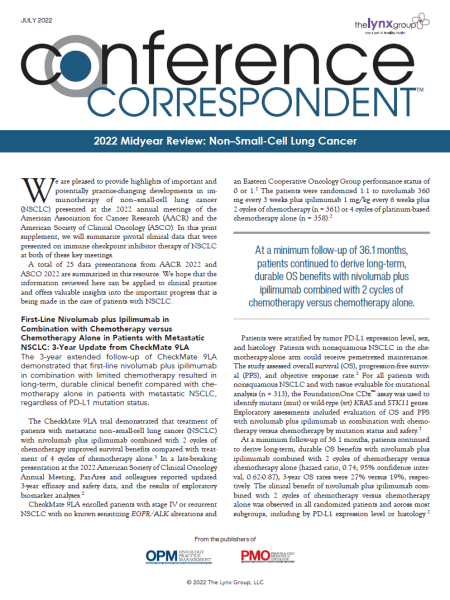Cancer-related fatigue occurs on most days over the course of the disease, lasts at least 2 weeks, and interferes with daily activities.1 Throughout the course of the disease, fatigue is the most frequently reported symptom in patients with lung cancer.1
Antineoplastic therapies are known to cause treatment-related tiredness, complicating an already difficult situation. Fatigue is the most common adverse event in patients on immune checkpoint inhibitors, which are the new standard of care in non–small-cell lung cancer (NSCLC) treatment.1
Exercise and physical activity, according to a significant body of data, improves the general health of patients with cancer and may help them live longer.2 Physical activity has been linked to a lower incidence of a variety of cancers in humans, and some evidence suggests that it may have a clinical benefit for patients with cancer.3 Exercise causes immune system cells to mobilize and redistribute to different bodily compartments, and exercise has been demonstrated to cause immunologic alterations in the tumor microenvironment in preclinical models. This suggests that combining exercise and immunotherapy may have a synergistic impact.3 The advantages of exercise include physical well-being, calm, freedom, relaxation, and improved sleep quality.
Given the substantial link between exercise and better outcomes in patients with cancer, strengthening systemic immunity and patient immunologic responses through exercise could be a complementary method to boosting immunotherapy responses, allowing for a more effective therapeutic response.2 Numerous studies have recently been published that provide some intriguing information about how exercise affects immune cell populations and function. The scientific premise that physical activity and exercise can help the immune system recover and optimize its responses to cancer is well-documented.2
The fatigue caused by cancer and further fatigue caused by immune checkpoint inhibitor treatment is an unfortunate aspect of cancer, including NSCLC. To maintain a patient’s functionality, nurses should become proactive advocates for physical activity throughout and after therapy. A well-thought-out progressive program of restorative exercise and energy-saving skills can help manage fatigue as a therapeutic complement to antineoplastic treatment. Aerobic exercise for at least 30 minutes a day for 5 days per week is an ideal exercise routine for patients with cancer to strive toward, if they can manage.3
References
- Almeida C, Chemela R. The role of physical exercise and energy conservation in the management of fatigue in NSCLC patients under IO. Ann Oncol. 2021;32(suppl 5):S1278.
- Gustafson MP, Wheatley-Guy CM, Rosenthal AC, et al. Exercise and the immune system: taking steps to improve responses to cancer immunotherapy. J ImmunoTherapy Cancer. 2021;9:e001872.
- Olofsson GH, Jensen AWP, Idorn M, Straten PT. Exercise oncology and immune-oncology; a (future) dynamic duo. Int J Mol Sci. 2020;21:3816.

